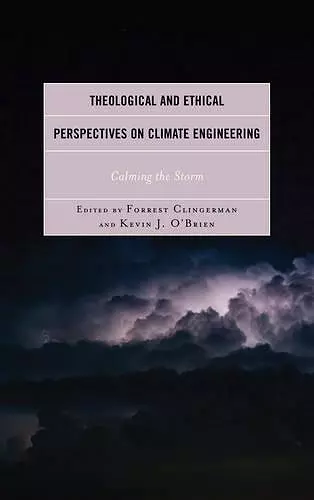Theological and Ethical Perspectives on Climate Engineering
Calming the Storm
Kevin J O'Brien editor Forrest Clingerman editor
Format:Hardback
Publisher:Bloomsbury Publishing PLC
Published:9th Sep '16
Currently unavailable, and unfortunately no date known when it will be back

The climate is changing as an unintended consequence of human industrialization and consumerism. Recently some scientists and engineers have suggested climate engineering—technological solutions that would intentionally change the climate to make it more hospitable. This approach focuses on large-scale technologies to alleviate the worst effects of anthropogenic climate change. This book considers the moral, philosophical, and religious questions raised by such proposals, bringing Christian theology and ethics into the conversation about climate engineering for the first time. The contributors have different views on whether climate engineering is morally acceptable and on what kinds of climate engineering are most promising and most dangerous, but all agree that religion has a vital role to play in the analysis and decisions called for on this vital issue.
Calming the Storm presents diverse perspectives on some of the most vital questions raised by climate engineering: Who has the right to make decisions about such global technological efforts? What have we learned from the decisions that caused the climate to change that might shed light on efforts to reverse that change? What frameworks and metaphors are helpful in thinking about climate engineering, and which are counterproductive? What religious beliefs, practices, and rituals can help people to imagine and evaluate the prospect of engineering the climate?
Theologians, religious ethicists, and other religious studies scholars can play a key role in mediating reflection on scientific and technological options in light of core narratives and values that shape our understanding of climate change, and that orient ethical action. Other audiences that could benefit from this book include Christian communities that are engaged in environmental issues as well as scientists, engineers, policymakers, and others who are committed to deliberative public discourse on this topic…. A strength of this collection is the balance between theological and ethical perspectives, reflecting the importance of religious thought in both shaping our understanding of climate change and orienting our actions in response to it…. The book as a whole—especially its emphasis on narratives and storytelling—clearly demonstrates that climate engineering is not solely a scientific issue. The collection is illuminating and inviting; it deepens reflection on this precarious moment in history, and challenges us to be deliberative as the conversation surrounding climate engineering unfolds…. Clingerman and O’Brien’s Theological and Ethical Perspectives on Climate Engineering will enrich and deepen interdisciplinary and public reflection on these increasingly prominent proposals. * Reading Religion *
This book is not just fascinating to read, it also develops important ethical perspectives on climate engineering. For too long theological ethicists have lagged behind developments in science. This book charts new territory by anticipating those changes before full implementation and asking questions, both critical and constructive, about some of the potential ways forward. So, as well as making a clear case for the place of religion at the table of ethical deliberation on climate engineering, this book will help religious believers find new ways to approach such complex problems and arrive at informed judgments. Given the controversial nature of climate engineering this book will also provide a valuable teaching tool for both science students and those in religious studies, theology and environmental ethics. -- Celia Deane-Drummond, Oxford University
As methods of containing the horrors of climate change that are acceptable to most people of goodwill turn out to be inadequate and the threat of out-of-control global warming becomes an inescapable reality, scientists and technologists will propose responses from which many of us now recoil. Ethically sensitive people should not wait for the extreme crisis to start reflecting about these proposals. This book begins the process of informed reflection that has the potential to steer humanity wisely through choices that, thus far, many of us have refused to consider. -- John B. Cobb Jr., professor emeritus, Claremont School of Theology
Imagined projects of climate engineering are fast becoming a new meeting point for the sciences and humanities. Clingerman and O’Brien bring a series of unique theological perspectives into this conversation. Drawing from religious thought and tradition, this important volume shows the value of tempering scientific understandings of how climate works with accounts of what climate means, and why this matters for how people should act. -- Mike Hulme, Professor of Climate and Culture, King’s College London
What to do about climate change? This excellent set of essays examines one possible response: undertaking large scale climate engineering or intervention. Arguing persuasively that religious and theological perspectives are helpful in framing the discussion of such geoengineering, we are not offered any easy answers. Instead, drawing on a range of thinkers from Niebuhr to McFague to Jamieson, we are helpfully presented with critical discussions of—among other matters—temptation, time, finitude and loss, and patience. In the quickly developing literature on religion and climate change, Calming the Storm is a must-read. -- Peter M. Scott, Samuel Ferguson Professor of Applied Theology & Director of the Lincoln Theological Institute, The University of Manchester, UK
ISBN: 9781498523585
Dimensions: 234mm x 162mm x 23mm
Weight: 513g
242 pages